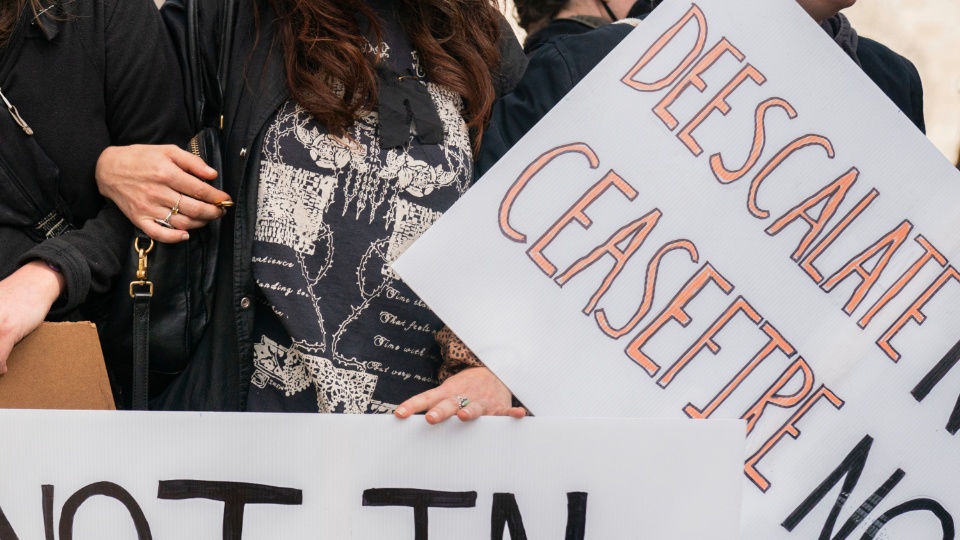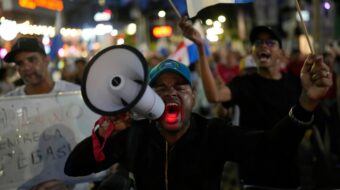
NEW YORK—More than 240 rank-and-file unionists, gathered via Zoom from around the country, agreed to work within their unions to create a grand coalition demanding a ceasefire in the war in the Middle East, and the opening of Gaza’s borders to food, water, power, medicines, and humanitarian aid, plus the release of hostages.
Convened on Oct. 16 by leaders of the National Writers Union, Auto Workers Region 9A, United Food and Commercial Workers Local 3000, and the United Electrical Workers, the “War Is Union Business” conference attracted past and present members of dozens of unions to discuss how to construct a united union push on U.S. lawmakers and the Biden administration to elevate those goals to top priority.
The one key point, enforced by the moderator, NWU member Tammy Kim, was not to debate the causes—or who started—the conflict.
“We’re trying to contain this conversation to a basic one-sentence thing: A ceasefire,” Kim said.
Some participants, however, cast the goals differently. “We’re trying to build solidarity with the Palestinians and end the violence,” one said. Another suggested joining the boycott, divestment, and sanctions (BDS) movement and not doing any business with Israeli companies. Many denounced “genocide” in Gaza.
Home to 2.2 million people, Gaza is the site of the current war and an impending Israeli military invasion. More than 3,200 Gazans have been killed since fighting began just over a week ago, along with almost 11,000 injured and 1,200 missing beneath the rubble. More than 1,400 Israelis have been killed, double that number have been injured, and as many as 200—ranging in age from nine months to 80 years old—have been taken hostage.
Conference participants considered several vehicles for moving their unions to support a ceasefire, opening Gaza’s borders, and providing humanitarian aid.
One proposal that appeared to have wide agreement was support for the Ceasefire Now Resolution introduced in Congress by Rep. Cori Bush, D-Mo., and others, declaring the U.S. government “has immense diplomatic power to save Israeli and Palestinian lives by calling for and facilitating” an immediate ceasefire and “to promptly send and facilitate humanitarian assistance” to Gaza.
“The United States bears a unique responsibility to exhaust every diplomatic tool at our disposal to prevent mass atrocities and save lives,” Bush said on introducing the measure, which is non-binding. “We can’t bomb our way to peace, equality, and freedom. With thousands of lives lost and millions more at stake, we need a ceasefire now.”
The most common suggestion was to craft resolutions to take to state federations, local labor councils, local unions, and allied organizations advocating a united front for a ceasefire. Participants will reconvene, again under National Writers Union auspices, on Oct. 19, to work on details.
“One of the most important things we did” in organizing what is now U.S. Labor Against Racism and War was to craft and lobby for resolutions demanding an end to labor’s support of the government’s Indochina War, said veteran organizer Gene Bruskin.
Bombing from above has hit Gazan infrastructure and people, including civilians. Hospitals, homes, municipal buildings, roads refugees are using to evacuate, and more have been hit. Power has been cut, leaving the overflowing hospitals unable to treat the injured, and short of medicines, as well. One big Gaza hospital exploded on Oct. 17. Aid officials said the cause is as yet unknown, but Hamas and the Israeli military are trading accusations.
John Braxton of Philadelphia described a pro-peace labor group established there that links the overall U.S. military budget with wars worldwide and lobbies for a cut in that spending. It advocates a measure by Rep. Barbara Lee, D-Calif., to cut the Pentagon budget by $100 billion. Braxton added he would provide a sample resolution to the group.
“We had to do a lot of membership education” on the ongoing conflict between Israel and the Palestinians “before we could move forward in Raleigh,” a member of United Electrical Workers Local 150 in North Carolina related.
He pointed out that without that education, “our members will get their information about the conflict from the mainstream media, which has been following the U.S. government’s line and avoiding words like ‘ceasefire.’”
Roberta Wood contributed to this article.
We hope you appreciated this article. At People’s World, we believe news and information should be free and accessible to all, but we need your help. Our journalism is free of corporate influence and paywalls because we are totally reader-supported. Only you, our readers and supporters, make this possible. If you enjoy reading People’s World and the stories we bring you, please support our work by donating or becoming a monthly sustainer today. Thank you!










